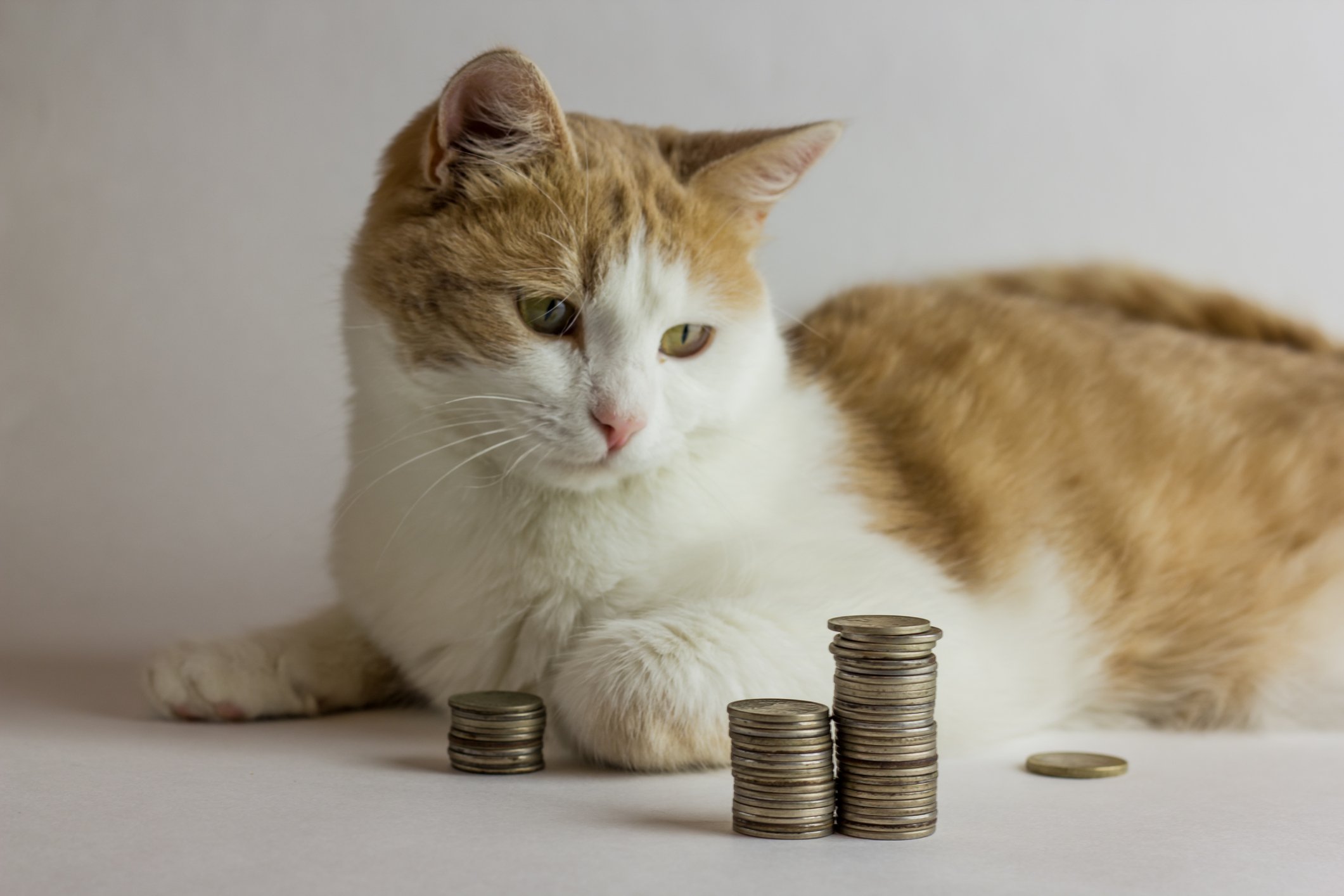
Image source: Getty Images.
Man's best friend may be the dog, but cats come in a very close second according to statistics from the American Pet Products Association. Within the U.S., 37% to 47% of all households have a dog, compared to 30% to 37% that have a cat. This works out to anywhere from 74 million to 96 million cats having humans to call their very own.
We often think of cats as leading pretty sedentary, and somewhat fussy, lives. They typically sleep about 20 hours a day, they're notoriously picky eaters (said the author who has two cats of his own), and if you dare touch them without their permission, you're liable to get clawed.
But there's also a chance that your cat is a better stock picker than you.
Are cats better stock pickers than humans?
In 2012, The Observer, a British newspaper, ran a contest that allowed three separate groups of participants to invest an imaginary 5,000 British pounds, which is the equivalent of about $6,080 based on today's U.S. dollar-British pound exchange rate. The three "groups" were as follows:
- A trio of professional money managers (Justin Urquhart Stewart of Seven Investment Management, Paul Kavanagh of Killick & Co., and Andy Brough of Schroders).
- A group of schoolchildren between the ages of 11 and 18 at John Warner School in Hoddesdon, England.
- A domestic house cat named Orlando.

Image source: Getty Images.
Clearly the seasoned stock pickers who get paid a pretty penny to offer their advice to their clients should win, right? At the end of the one-year contest, the stock pickers had indeed generated a gain of 3.5% from where they'd begun. The schoolchildren didn't fare nearly as well, with their portfolio down 3.2% from the beginning. However, Orlando, who chose his stocks by throwing his favorite toy mouse on a number grid that was associated with popular companies, left everyone in the dust with a year-end gain of 10.8%.
Allow that to sink in for a moment: a cat beat three professional stock pickers.
Of course, this isn't the first time supposedly smart money managers have underperformed. A few years ago four authors published their findings after studying a broad sample of 1,300 hedge funds between 1994 and 2009. What they found was that just 22% of money managers actually created risk-adjusted investment gains when accounting for management fees. The authors took it a step further and also examined how many of these firms added value by picking the right managers and avoiding the wrong ones. The answer they came up with was that a paltry 5.7% added value by picking the right managers, after deducting for fees! Not very encouraging.

Image source: Getty Images.
Valuable investment lessons your cat can teach you
If we take a step back and look past the humbling experience of professional money managers losing to a cat, there are lessons to be learned.
1. Stocks are inherently unpredictable over the short-term
Arguably the most important lesson here is the sheer randomness of the results. In a perfect world a cat shouldn't be beating professional money managers -- but the world isn't perfect, and the stock market is far from predictable.
A large number of investment biases practically ensure that investing never becomes predictable over the short-term. Confirmation bias is a good example. This is the tendency to confirm your existing beliefs and opinions by focusing on news, opinions, and ideas that happen to confirm your own. Confirmation bias is something we're all probably guilty of at some point or another because it makes us feel confident in our investments. Unfortunately, focusing on one side of an equation without taking into account the potential risks is a formula that can, and eventually will, lead to investment losses at some point.

Image source: Getty Images.
There are numerous investing biases that can lead to market unpredictability. Even if you're a level-headed long-term investor and pride yourself on examining all sides of an equation, we simply can't account for the millions of other investors who aren't even aware that these biases exist. This is why trying to time the market is impossible to do over long periods of time.
2. Even experts are fallible
Secondly, Orlando's success is a good reminder that there's no such thing as the perfect stock picker. Professional money managers can be just as fallible as John and Jane Q. Investor, which is all the more incentive to learn as much as possible about investing so you can control your own destiny.
According to a study conducted by NerdWallet in 2013, just 24% of active money managers beat the market over a 10-year period. Broken down a bit further, just 21% outperformed the market on a statistically significant basis. NerdWallet's findings essentially showed that most investors would have done better investing in index funds, or investing on their own, rather than entrusting their assets to money managers.
3. Sometimes it pays to be sedentary when it comes to investing
Thirdly, the sedentary life of a cat serves as a much-needed reminder to investors that sometimes the best strategy is to sit back and do nothing at all.
Money managers, more often than not, try to do too much. The reasoning is easy enough to understand: they have a small cadre of clients to answer to, and consistently altering their investment portfolio to include the "hottest stocks" can attract new money. However, trying to do too much over the short-term will often lead to underperformance, whether we're talking about money managers or merely active traders.

Image source: Getty Images.
A now-famous study conducted by UC Berkeley's Terry Odean looked at 10,000 brokerage accounts of individual investors spanning a seven-year period and examined roughly 163,000 executed trades. Among these trades, Odean was able to identify instances where investors sold one stock and, within a short timeframe, bought another stock. Odean took such trading actions as a signal that traders believed the sold stock would drop in value and the purchased stock would rise in value. What the findings showed, though, was that the sold stock outperformed the purchased stock by a substantial average of 3.2 percentage points per year! In other words, investors should have just hung onto the stocks they owned for the long-term.
A separate study from Odean and his UC Berkeley colleagues that was published in 2011 examined whether or not day-trading could be profitable. The study's findings showed that just 13% of day-traders wind up being profitable on an annual basis, with only 1% consistently finding a way to profit due to high commission fees and market unpredictability.
While I'm not telling you to sleep for 20 hours a day, perhaps it's time to stop overthinking your investment strategy and allow what you have bought to go to work for you over time. If it could work for Orlando, it could work for you, too.





